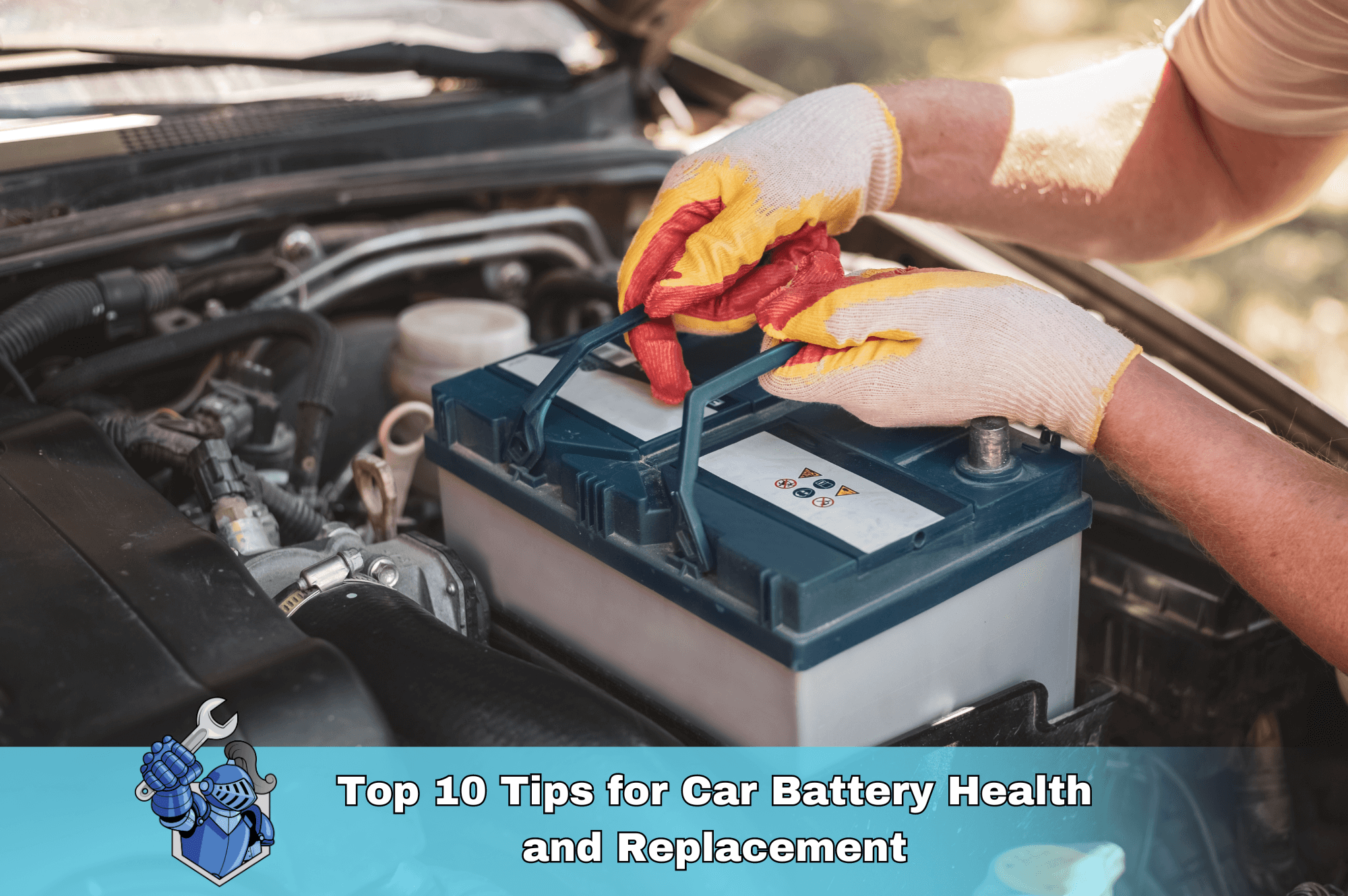Maintaining the health of your car battery is essential for the smooth operation of your vehicle. A well-maintained battery ensures that your car starts reliably, the electrical systems function properly, and you avoid the inconvenience of unexpected breakdowns. In this guide, we'll share the top 10 tips for keeping your car battery in top condition and knowing when it's time for a replacement.
1. Regularly Check Battery Terminals
Battery terminals can corrode over time, leading to poor electrical connections. Regularly inspect and clean your battery terminals to ensure they are free of corrosion. You can use a mixture of baking soda and water to clean the terminals, followed by a thorough rinse with clean water. Make sure to dry them completely before reconnecting the cables.
2. Keep Your Battery Securely Fastened
A loose battery can vibrate excessively, causing damage to the battery plates and leading to a reduced lifespan. Always ensure your battery is securely fastened in its tray to prevent unnecessary movement. If you're unsure how to do this, consult your vehicle's manual or ask a professional for assistance.
3. Limit Short Rides
Short rides prevent your car's battery from fully charging, which can lead to sulfation, a condition where lead sulfate crystals form on the battery plates, reducing its efficiency. Try to combine short trips into one longer journey or take your car for a longer drive occasionally to ensure the battery gets a full charge.
4. Turn Off Electronics When the Engine is Off
Leaving electronics like lights, radio, and other accessories on when the engine is off can quickly drain your battery. Make it a habit to turn off all electronics before shutting down your vehicle. This simple step can help preserve your battery's charge and extend its life.
5. Perform Regular Battery Testing
Regular battery testing can help you monitor its health and prevent unexpected failures. Many auto parts stores offer free battery testing, or you can invest in a battery tester for home use. Testing your battery at least twice a year can give you a good indication of when it might be time for a replacement.
6. Maintain Your Vehicle’s Charging System
Your car's alternator charges the battery while the engine is running. If the alternator is not functioning properly, it can lead to an undercharged or overcharged battery, both of which can reduce battery life. Have your charging system checked regularly to ensure it's working correctly.
7. Avoid Extreme Temperatures
Extreme temperatures, both hot and cold, can affect your battery's performance. In hot weather, the fluid inside the battery can evaporate, leading to internal damage. In cold weather, the battery's ability to provide sufficient power decreases. Park your car in a garage or shaded area during extreme temperatures to help maintain battery health.
8. Keep the Battery Clean
Dirt and grime can conduct electricity and drain your battery. Regularly clean the top of your battery with a damp cloth to remove any dirt or debris. This can help prevent unnecessary power drainage and prolong your battery's life.
9. Check the Battery Case for Damage
Inspect your battery case for any signs of damage, such as cracks or bulges. A damaged battery case can indicate internal damage and a higher risk of battery failure. If you notice any damage, it's best to replace the battery immediately to avoid potential issues.
10. Know When to Replace Your Battery
Even with proper maintenance, car batteries typically last 3-5 years. If your battery is approaching this age, it's a good idea to start considering a replacement. Signs that your battery may need to be replaced include slow engine crank, dimming headlights, and the check engine light coming on. If you're unsure, have a professional inspect your battery.
Conclusion
Maintaining your car battery is crucial for the overall health and performance of your vehicle. By following these tips, you can extend the life of your battery and avoid the inconvenience of unexpected breakdowns.
For more information on car maintenance and tips, visit the NobleQuote Learning Center. Although we don't cover batteries, NobleQuote offers comprehensive services to help you find the best quotes for your car protection needs. Check out our services today to ensure your vehicle is protected.
External Resources:
By keeping these tips in mind, you can ensure your car's battery remains in good condition, providing reliable performance for years to come. Remember, a little maintenance goes a long way in extending the life of your car battery and ensuring your vehicle runs smoothly.
FAQ: Car Battery Health and Replacement
1. How often should I check my car battery?
It's recommended to check your car battery every six months or during regular vehicle maintenance. Regular checks help identify potential issues before they become serious problems.
2. What are the signs of a failing car battery?
Common signs of a failing car battery include slow engine crank, dimming headlights, electrical issues, and the check engine light coming on. If you notice any of these signs, it's best to have your battery tested.
3. How can I clean battery terminals?
To clean battery terminals, disconnect the cables starting with the negative terminal. Mix baking soda and water to create a cleaning solution, then use a brush to scrub the terminals. Rinse with clean water and dry thoroughly before reconnecting the cables.
4. Why does my battery die in cold weather?
Cold weather can reduce a battery's ability to hold a charge and deliver power, making it harder to start the engine. Keeping your car in a garage or using a battery blanket can help mitigate this issue.
5. How long does a car battery typically last?
Car batteries typically last between 3 to 5 years. However, factors such as driving habits, climate, and maintenance practices can affect this lifespan.
6. What is sulfation, and how can I prevent it?
Sulfation occurs when lead sulfate crystals form on the battery plates, reducing efficiency. It can be prevented by regularly driving your car for longer periods to ensure the battery gets a full charge.
7. Can I replace my car battery myself?
Yes, you can replace your car battery yourself if you're comfortable doing so. However, it's important to follow safety procedures and consult your vehicle's manual. If you're unsure, it's best to have a professional handle the replacement.
8. How can I extend the life of my car battery?
You can extend the life of your car battery by performing regular maintenance, avoiding short trips, turning off electronics when the engine is off, and keeping the battery clean and secure.
9. What should I do if my battery case is damaged?
If you notice any damage to your battery case, such as cracks or bulges, it's important to replace the battery immediately to avoid potential failure and safety risks.
10. How does the charging system affect my battery?
Your car's charging system, including the alternator, keeps the battery charged while driving. If the system isn't functioning properly, it can lead to an undercharged or overcharged battery, both of which can shorten the battery's lifespan. Regular checks of the charging system are recommended.
Suggestions for you
Read MoreLet’s work together
Every week we showcase three charitable organizations that our donations are sent to. Our clients are able to choose which of these three will receive their gift when they add coverage to their vehicle...




